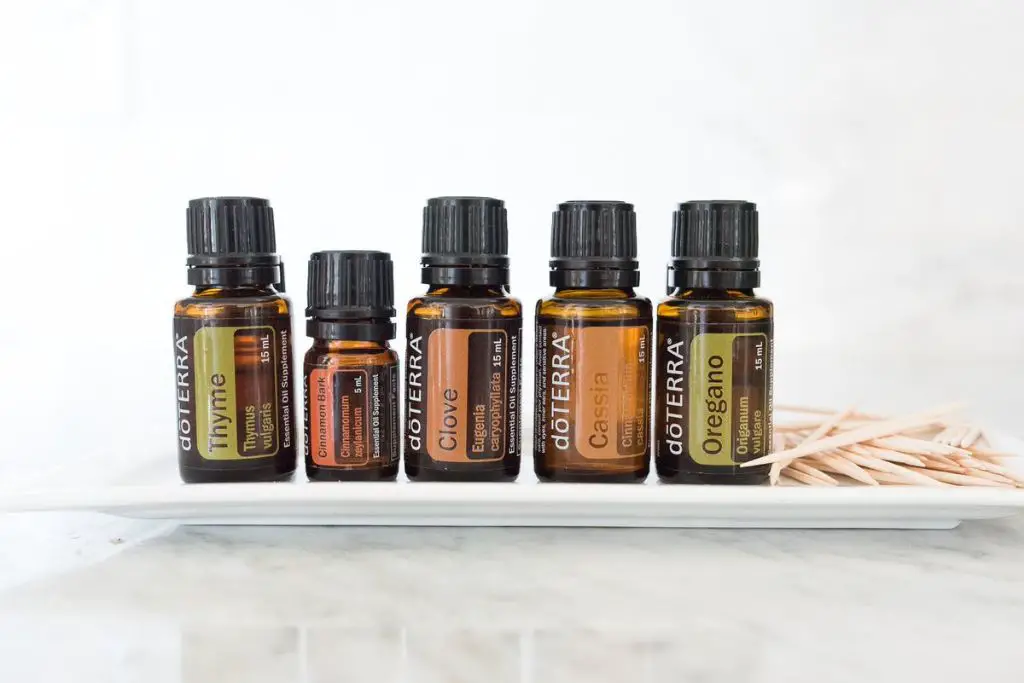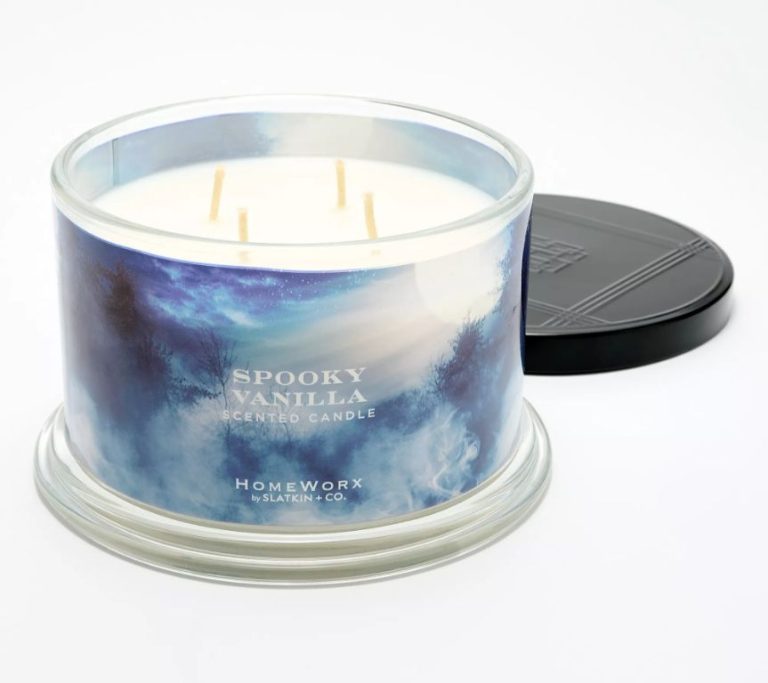What Is The Strongest Smelling Essential Oil?
Essential oils are highly concentrated extracts derived from the roots, flowers, leaves, bark, and fruits of plants. They capture the natural fragrance and flavor profile of the plant they are derived from (1). Essential oils have been used for over 6,000 years for health, beauty, and relaxation purposes. They offer many therapeutic benefits and are most commonly used in aromatherapy and massage therapy settings (2).
Some of the top uses and benefits of essential oils include reducing stress and anxiety, enhancing sleep, alleviating headaches, improving mood, and more. Essential oils are also commonly used to naturally scent cosmetics, soaps, candles, and cleaning products (2).
What Makes an Essential Oil Strong Smelling
Essential oils get their fragrant aromas primarily from volatile organic compounds such as terpenes, alcohols, aldehydes, ketones, esters, and oxides (Baseformula, 2020). Different combinations and concentrations of these compounds give each essential oil its unique scent signature. Some key fragrance compounds found in potent essential oils include:
- Monoterpenes like limonene in citrus oils. These give a fresh, uplifting aroma.
- Sesquiterpenes like caryophyllene in spicy oils. These have a woody, earthy scent.
- Phenols like thymol in oregano oil. These have a strong, sometimes medicinal smell.
- Aldehydes like citral in lemongrass oil. These have a sharp, citrusy aroma.
The oils highest in certain fragrant compounds like monoterpenes, phenols, and aldehydes often smell the strongest. Combining high levels of multiple aromatic compounds can amplify the intensity. Extraction methods also affect scent strength, with cold pressed oils retaining more volatiles.
The Strongest Smelling Essential Oils
The strength of an essential oil’s aroma is determined by its chemical makeup. Oils high in certain aromatic compounds like phenols, esters, aldehydes, and ketones tend to have very potent scents. Here are some of the strongest smelling essential oils:

Oregano Essential Oil
Oregano oil has a strong, spicy herbal smell. It contains high levels of carvacrol, a phenol that gives it an intense aroma. In fact, oregano oil can be one of the most overpowering essential oils. It should always be diluted before use on the skin.
Cinnamon Bark Essential Oil
True cinnamon bark oil has an extremely warm, spicy fragrance. It is much more potent than the more common cassia oil. Cinnamon bark contains high amounts of cinnamaldehyde, giving it a powerful smell.
Clove Bud Essential Oil
Clove oil is distilled from clove buds and has a very strong, piercing aroma. It contains high levels of eugenol, which produces a sweet but very intense spicy scent. Clove oil should be diluted thoroughly due to its strength.
Thyme Essential Oil
Thyme oil has a medicinal, herbaceous aroma. With thymol as its main component, thyme oil has a sharp, penetrating fragrance that can be quite potent for some. It is best used diluted or blended with milder oils.
Oregano Essential Oil
Oregano essential oil has an extremely strong and spicy aroma that some describe as being similar to oregano herbs but more potent. The powerful scent comes from the high concentration of aromatic compounds like carvacrol and thymol.1 Oregano oil contains phenols which give it antioxidant, antifungal, and antibacterial properties.2
Oregano oil has many uses and benefits. It is commonly used for its antimicrobial effects against certain viruses, bacteria, parasites, and fungi. Studies show oregano oil may be effective for treating fungal infections like athlete’s foot as well as viral infections like the common cold.3 Oregano oil can also help reduce inflammation and may aid in wound healing. It has demonstrated benefits for respiratory conditions like allergies, sinusitis, sore throat, and coughs. Some use oregano oil topically to help treat skin conditions like acne, dandruff, rosacea, and psoriasis. The strong aroma of oregano oil makes it a popular ingredient in soaps, perfumes, and aromatherapy. It also has culinary uses to add a robust, savory flavor to foods.
Cinnamon Bark Essential Oil
Cinnamon bark essential oil has a very strong, spicy and sweet aroma that is quite distinctive. Its scent profile is characterized by warm, earthy cinnamon spice notes. Many describe the fragrance as being similar to fresh baked goods like apple pie or cinnamon buns.
Cinnamon bark oil is popularly used for its warming and soothing properties. It can help promote circulation when applied topically. The oil is also valued for its ability to energize and uplift mood. Its sweet and spicy aroma makes it a nice addition to diffuser blends.
Some key benefits of cinnamon bark essential oil include:
- Supports oral health – Has antibacterial properties that can help freshen breath and protect teeth and gums
- Promotes smooth, glowing skin – Has cleansing and toning properties for skin when diluted and applied topically
- Boosts immunity – High in antioxidants like polyphenols that can help strengthen the immune system
- Eases muscle soreness – Has a warming effect that can help soothe tired muscles when massaged into the skin
Cinnamon bark oil blends well with citrus, spice, floral and woodsy oils like orange, clove, rosemary and cedarwood. It should always be diluted properly before use especially for skin applications. While cinnamon oil offers many benefits, it is very concentrated and can cause irritation if not used correctly.
Clove Bud Essential Oil
Clove bud essential oil has a very strong, spicy and warm scent that is often described as peppery or clove-like. The scent comes from the chemical compound eugenol which makes up 70-90% of the oil [1]. The rich aroma makes clove oil popular for use in aromatherapy, perfumes, soaps and candles.
Some of the main uses and benefits of clove bud essential oil include:
- Dental care – Clove oil has pain-relieving and antibacterial properties that can temporarily relieve toothache pain and fight oral bacteria and infections [2].
- Skin health – The antioxidant content protects skin cells from damage. Clove oil is also thought to have antimicrobial and anti-inflammatory effects on skin when applied topically [3].
- Immune support – Some research shows clove oil may stimulate the immune system and have antiviral effects [1].
- Stress relief – Clove oil is commonly used in aromatherapy for its soothing, calming scent that can ease nerves and tension.
Overall, clove essential oil is prized for its rich, warm aroma and therapeutic medicinal effects. Its strong scent also makes it a popular component of fragrances and natural health remedies.
Thyme Essential Oil
Thyme essential oil has a very potent, herbal aroma. Its scent profile is characterized by strong herbal, woodsy notes that provide an invigorating, cleansing sensation. The unique smell of thyme oil comes from its high concentration of thymol, a compound that has antibacterial effects and a spicy, pungent aroma (1). Thyme oil is extracted from the leaves and flowering tops of the thyme plant via steam distillation. This extraction process helps concentrate the thymol content and aromatic compounds in the oil.
Thyme essential oil is prized for its many therapeutic benefits. It contains antioxidants that support the body’s natural defenses and has antimicrobial, antifungal, and antibacterial properties (2). Thyme oil can help prevent bacterial infections, boost immunity, ease coughing, and reduce pain and inflammation. When inhaled, its scent may help clear sinuses and relieve headaches. Thyme oil is also used to improve skin and hair health. Overall, its strong, invigorating aroma along with myriad medicinal benefits make thyme a popular essential oil.
Peppermint Essential Oil
Out of all the essential oils, peppermint is one of the strongest smelling. The scent of peppermint oil is described as being refreshing, sharp, and menthol-like. The menthol gives it a minty aroma that is easily recognizable. Peppermint essential oil is derived from the leaves of the peppermint plant (Mentha piperita), a hybrid of watermint and spearmint. The main chemical component that gives peppermint oil its potent smell and therapeutic benefits is menthol.
Peppermint oil has many uses due to its strong, invigorating scent. It is commonly used in aromatherapy to stimulate the mind and promote mental clarity. The cooling sensation of peppermint oil also makes it useful for soothing headaches, migraines, and muscle pains when applied topically to the skin. Peppermint oil can also help open up sinus passages when inhaled. Due to its antispasmodic effects, it is sometimes used to aid digestion issues like IBS. The strong smell of peppermint oil also acts as an insect repellent. In addition, peppermint oil is used as a natural fragrance in soaps, cosmetics, and cleaning products.
Some of the benefits of peppermint oil include:
- Relieves headache and migraine pain (Healthline)
- Opens up congested sinuses
- Improves mental clarity and focus
- Repels insects
- Soothes indigestion
Eucalyptus Essential Oil
Eucalyptus essential oil has an extremely strong, woody, and medicinal scent. Of all the essential oils, eucalyptus has one of the most potent and recognizable aromas. The main chemical component that gives eucalyptus oil its robust smell is eucalyptol, also known as cineole. Eucalyptol has been studied for its antimicrobial and anti-inflammatory properties (Source).
Eucalyptus oil has many therapeutic uses and benefits. It is commonly used in aromatherapy and personal care products to promote clear breathing and soothe joint and muscle pain. When diffused, eucalyptus oil can help open up the nasal passages and provide relief from stuffy nose, cold, cough, and congestion symptoms. Applying diluted eucalyptus oil topically can reduce arthritis pain and sore muscles. Eucalyptus oil can also be used as an insect repellant and natural surface cleaner (Source).
With its extremely potent medicinal aroma, eucalyptus essential oil is highly effective for clearing respiratory conditions, disinfecting, and repelling insects naturally.
Conclusion
In summary, the strongest smelling essential oils include oregano, cinnamon bark, clove bud, thyme, peppermint, and eucalyptus. These oils pack a powerful aromatic punch due to their high concentration of aromatic compounds like phenols, aldehydes, ketones, and esters. When diffused, these essential oils can fill a room with their intense scent profiles. However, their strength also makes them more suitable for diluted or occasional use. Oregano, cinnamon, clove, and thyme oils in particular have very high phenol content, which gives them antiseptic and antimicrobial properties but also makes them irritating to skin in high concentrations. Peppermint and eucalyptus have menthol and 1,8-cineole as primary components, giving them a strong minty aroma while also promoting respiratory health when inhaled or applied diluted. Overall, using these essential oils sparingly can provide helpful aromatic and topical effects, but their intensity means they require more care in usage.



